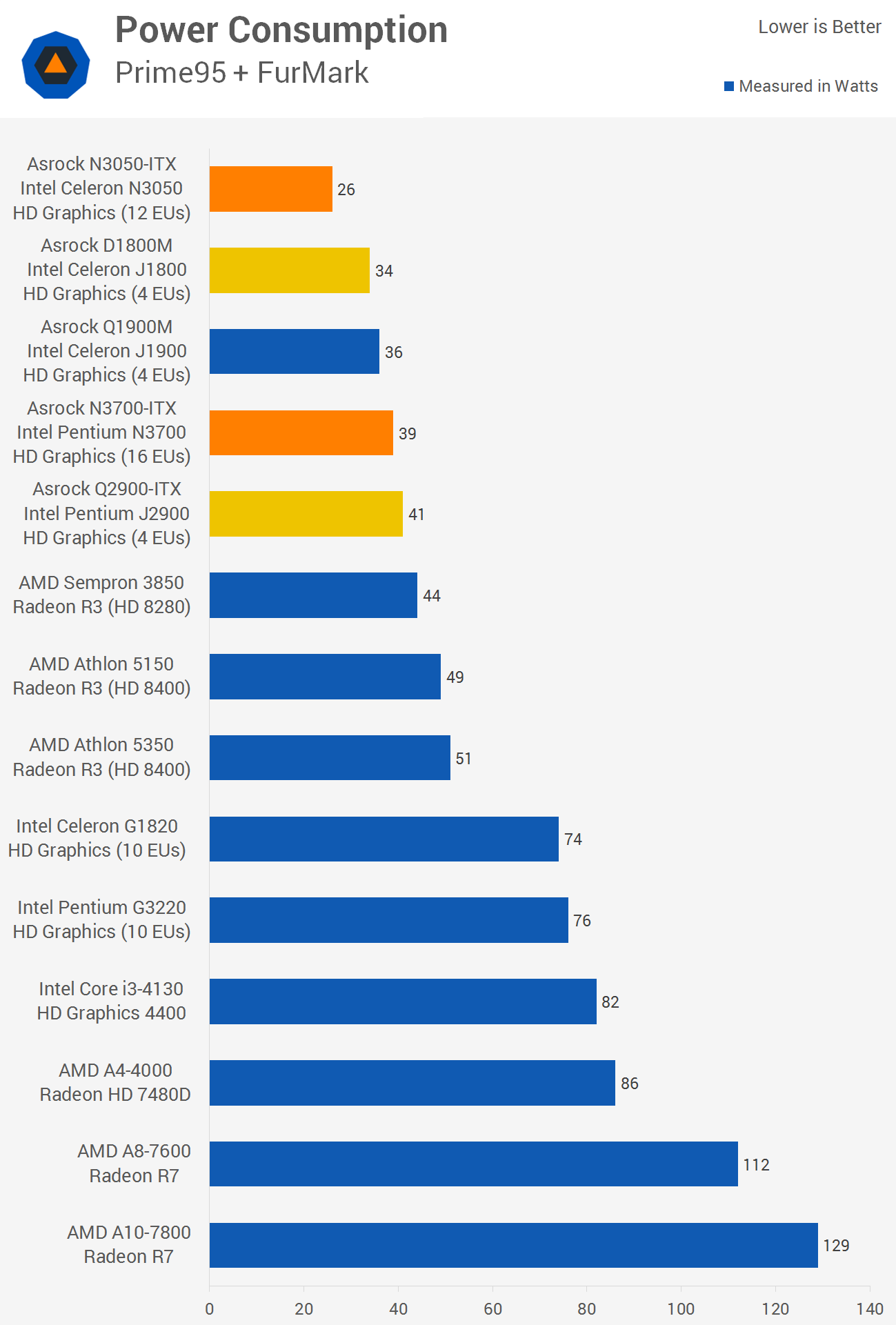Intel 'Braswell' Celeron N3050 & Pentium N3700 Review > Power Consumption, Final Thoughts - cogswellreacquink
Power White plague, Final Thoughts

With the system left to idle the Pentium N3700 used up 28% less power than the Pentium J2900. The Celeron N3150 saw even fitter savings (39%) concluded its Bay Hang back-D equivalent weight, the J1800.

With all quartet cores under full load the Pentium N3700 consumed 24% less power than the J2900. The Celeron N3150 did even better, consuming 41% less power than the J1800.

What's interesting is once we place full freight happening both the CPU cores and the GPU, the Pentium N3700 is just 5% more than efficient than the J2900. That said, the Celeron N3150 tranquil consumed 24% less major power than the J1800.
More efficient than Bay Trail? We're not and then sure
Upon receiving these fresh affordable Braswell hopped-up motherboards from Asrock we were keen to begin testing. Unfortunately, that excitement began wearing off as we delved into benchmarking, though we shouldn't really be surprised with most of the results.
Braswell marks a "beat" in Intel's click-tock scheme and brings a shrink of the early microarchitecture's work on technology American Samoa anti to a new microarchitecture, Eastern Samoa you'd expect with a tock. However, Braswell is more than just a die-shrink, featuring updated Central processor cores equally well as an 8th generation GPU architecture.
The samara improvements should show in price and power consumption, merely the older Bay Trail-D processors are clocked considerably high, which means they will naturally consume more power. This wouldn't be an issue if the lower clocked Braswell parts were as rapid or faster, merely they weren't, at any rate not for the just about disunite.
So while the Braswell-based Pentium N3700 did consume 28% to a lesser extent ability than the Alcove Trail-D Pentium J2900 with the CPU cores under full load, it isn't 28% more efficient because it was 18% slower in Excel 2013 and Photoshop CC for exercise.

This brings us back to the fact that the Pentium N3700's base clock frequency is clocked 33% lower with a 10% slower boost clock speed compared to the J2900, which makes it hard to determine if Braswell is in point of fact Thomas More efficient than Bay Trail.
Looking back at our application examination, there wasn't a single instance where the N3700 was quicker than the J2900. Moreover, the N3700 was almost always at least 10% slower than the J2900, which as we just mentioned is the synoptic deficit As the boost clock speed.
Sadly it isn't possible to tinker with the clock speeds of these embedded processors, with Asrock oblation nary way to limit or adjust frequencies. This rules out a true clock-to-time comparison. Given what we have seen, there doesn't look for be any tactile differences between Bay Go after and the new Braswell SoCs in terms of performance or efficiency.
What we do know is that for general use these fres Braswell processors are slower than their Bay-Trail equivalents, at least 10% slower, which is very disappointing. While 3D performance has been greatly better, Braswell is nonetheless rubbish for budget gaming.
Nevertheless, it does bridge the col between Intel and AMD for ultra-budget 3D performance, so much so that the Pentium N3700 is faster than the Athlon 5350. The AM1 political program's GPU performance was the only reason we would have previously picked it over Bay Trail and with Braswell improving in this area we see no reason to snuff it AMD anymore.
That said, if gaming performance isn't a precedency then we would side Asrock's Q2900-ITX motherboard terminated the newer and slower Asrock N3700-ITX as the former is faster in anything non-3D. If you show our Bay tree Trail coverage, you'd know we ultimately wouldn't pick the Q2900-ITX either because the Q1900-ITX delivers the same carrying out while costing 27% less.
Pros: More USB 3.0 and SATA ports compared to its predecessor, DisplayPort added to the N3700-ITX. Braswell should be more energy efficient though calculative by how much is hard to say given it was also slower. GPU performance was much improved.
Cons: Zero PCIe x16 expansion slot for the Miniskirt-ITX boards. Lower clock speeds base less power is consumed but in the case of Braswell IT likewise meant working slower so we question the efficiency. Availability is poor arsenic we are heretofore to see any Braswell desktop boards on sale.
Source: https://www.techspot.com/review/1014-intel-celeron-n3050-pentium-n3700/page7.html
Posted by: cogswellreacquink.blogspot.com


0 Response to "Intel 'Braswell' Celeron N3050 & Pentium N3700 Review > Power Consumption, Final Thoughts - cogswellreacquink"
Post a Comment